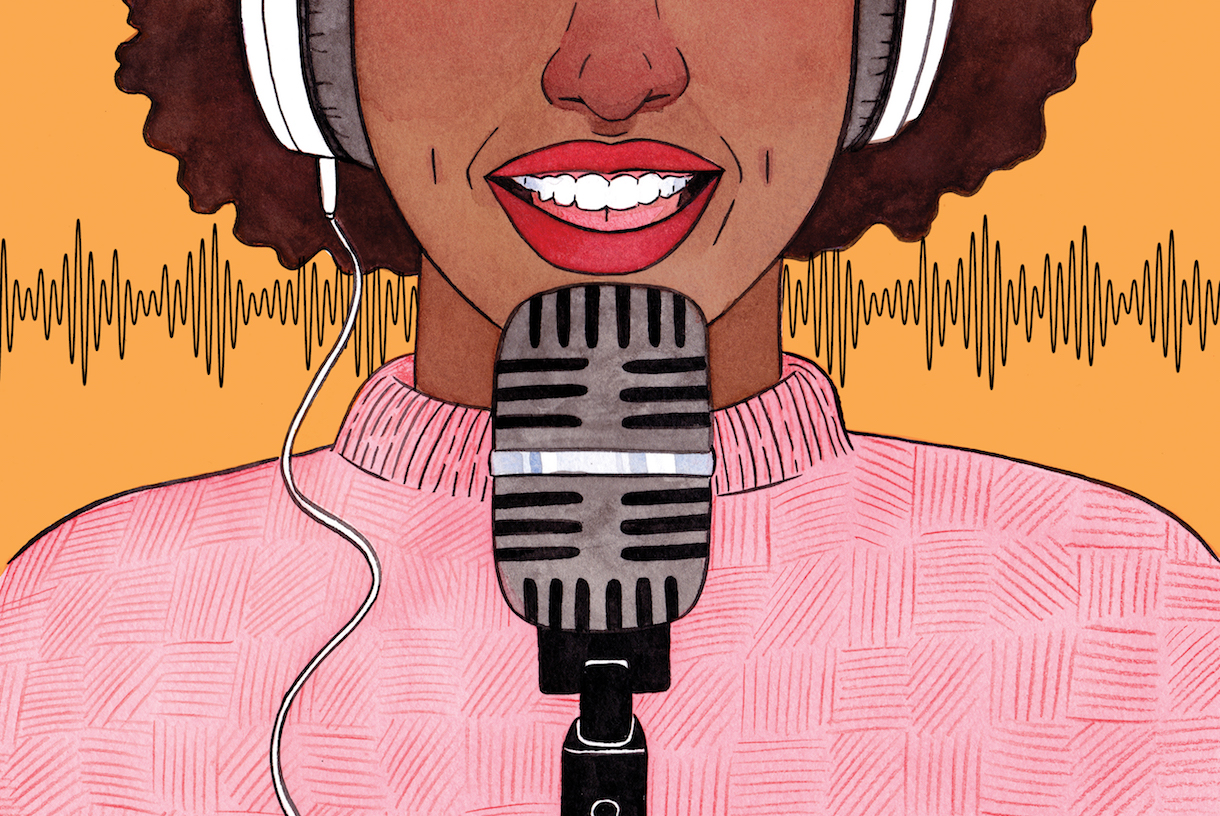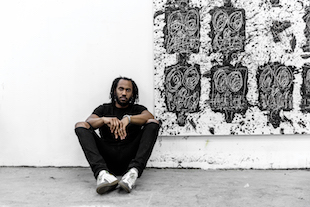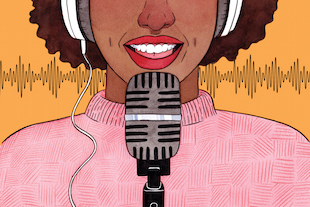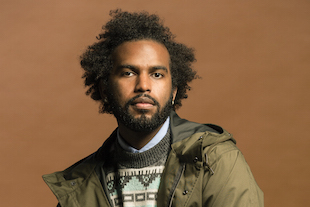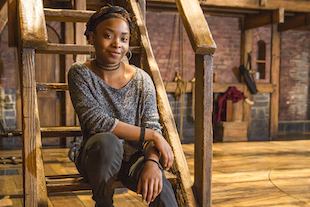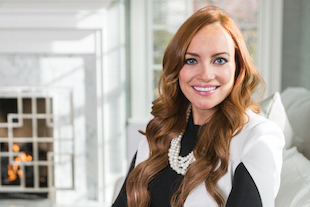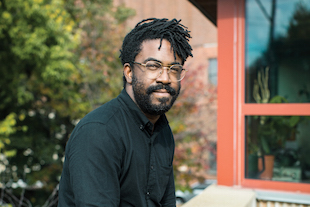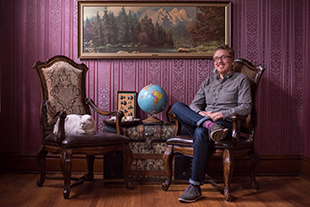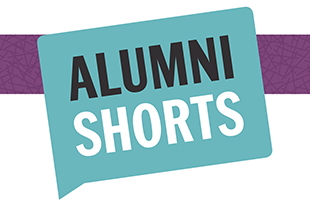Ear Buds
DEMO Feature
On the air and behind the scenes, Columbia College Chicago alumni build the podcast world.
Podcasts have never been bigger. Edison Research reported that the number of podcasts listeners jumped by 12 million between 2017 and 2018—with four out of 10 Americans hitting that download button.
As those numbers keep rising, you can find Columbia College Chicago alumni shaping the podcast world both on the air and behind the scenes.
So what’s in your queue?
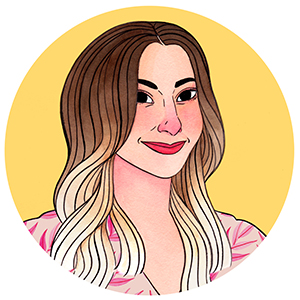
Lara Schoenhals: The Pop-Culture Hot Shot
Lara Schoenhals ’08 wants to make you LOL. She pronounces it “lawl,” perfectly delivered in her deadpan drawl, peppered through her three podcasts. From reality TV to her own life as a writer in Los Angeles, each show explores a different facet of her pop-culture obsessions—and they’re all going to make you laugh out loud.
Schoenhals started podcasting because she became too infatuated with reality show Vanderpump Rules. “It was a show I really found myself evangelizing to the greater public,” she says. “I was like, ‘I need to make something out of this obsession. Otherwise I’m just a weird girl who’s obsessed with this TV show.’”
Real Housewives spin-off Vanderpump Rules chronicles the lives of wannabe models, movie stars, and musicians working as waitstaff at LA’s SUR. (That stands for Sexy Unique Restaurant.) Terrible decisions are made; Pumptinis are thrown.
Sexy Unique Podcast riffs on the show’s hookups and heartbreaks. Schoenhals and a revolving cast of pals deconstruct the show episode by episode. Right now, Sexy Unique Podcast is downloaded about 25,000 times per episode. Plus, Schoenhals helms two other podcasts—advice column-inspired talk show Babe? and Saving Sex and the City 3 (where she and guests pitch plots for the nonexistent Sex and the City threequel).
Today, Schoenhals has turned podcasting into her full-time gig by selling ads and letting devotees support the shows through subscription service Patreon. “I realized if you’re a creator and you’re putting struff out into the world and you have an audience, you should try to monetize that,” she says. “You need to assign some sort of value to the work that you’re making.”
Next, she’s working on a new website to house her shows and hopes to start producing and promoting other people’s podcasts, building a sort of Lara Schoenhals podcast universe. But through it all, the goal remains the same: “I just want to keep them LOLing and making myself LOL.”
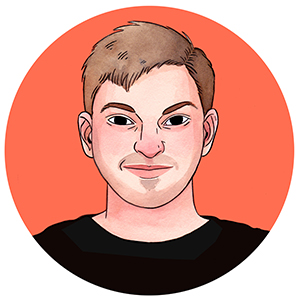
John Fecile: The Storyteller
Philly-raised John Fecile ’11 studied directing at Columbia College Chicago, interned at documentary house Kartemquin Films, and worked as a producer and reporter for WBEZ Chicago’s Curious City. In 2011, Fecile’s younger brother Mike suffered a traumatic brain injury after falling four stories from his college apartment’s balcony. Fecile documented, in audio format, his family’s long journey as they anguished over Mike’s future; in 2015, they decided to end Mike’s life. In December 2016, Fecile’s one-hour episode “Blink Once for Yes” aired on PRX’s Love + Radio (and later WNYC’s Snap Judgment), and went on to win two international storytelling awards.
Today, Fecile is an independent filmmaker and radio reporter. He is a regular contributor to the podcasts Snap Judgment and 99% Invisible. In addition to “Blink Once for Yes,” his podcasts include “Breaking Bad News,” about how doctors deliver bad news to patients, and Beyond Faces of Death, about the horror-movie franchise.
DEMO: "Blink Once for Yes" was your first major foray into podcasting. Why did you decide to tell that story?
I knew I wanted to explore that material, but I felt uncomfortable bringing a camera and a camera crew into the situation and conversations that I knew were going to happen. We were all really ready to talk about it. And I sensed that.
What you don’t hear in that piece is, it took four years between my brother’s injury and his death. We had never heard of this experience happening to anybody else. We didn’t know what traumatic brain injuries were like. We didn’t know what it was like to make an end-of-life decision. I’d never heard a story about it. So there was a desire to create a document for other people.
DEMO: You said that some people criticized you for "taking the microphone into places where it shouldn't have been." What do you mean?
The perception among some people on social media was that I was sort of uncaring and parachuting in to interview my parents at the hardest time in their lives—it’s a good concern to raise. We producers are hungry for stories, and there’s a tendency to want to record everything. But you need to be clear about when that is not going to help an already fraught situation. With “Blink Once for Yes,” I think my family was really ready to talk about it.
[With] my younger brother [Pat], … I call him a dick, and you hear us fight. I left that piece in, because I do sound like an asshole. We were angry at each other, and that is one of the things that happens when people die. … I wanted to preserve that part of the experience. … I gave [family members] the opportunity to tell me if there was anything they wanted me to cut or a place where I should pull back. And they didn’t.
DEMO: Do you think this process allowed your family to open up in a way that they wouldn't have had the opportunity to do in another way?
I don’t think they would’ve had an opportunity to open up. I don’t think we would’ve had these conversations that you hear on the piece if I hadn’t been making it. In a way, we had avoided talking about heavy things while my brother was injured and alive. And making the piece gave us a chance to do that.
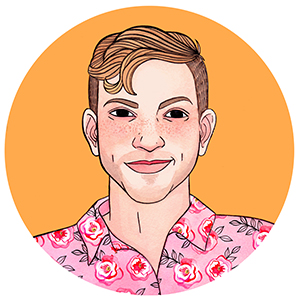
Devlyn Camp: The Historian
“I’m in charge of our lighting equipment, making sure it’s operating, fixing things, cleaning things. If we have a show at Concord, and that tends to be about two to three days a week on average, then it’s programming the lights for shows, running the shows. We average 10-12 hours in a day.”
Devlyn Camp’s walls are covered in notecards and sticky notes. Stacks of used books bear margin notes and highlights. “It looks like a serial killer lives in my apartment,” says Camp.
But it’s all research for Camp’s serialized history show Mattachine. The podcast tells the largely forgotten story of the mysterious Mattachine Society, one of the first LGBTQ organizations in the United States, which met in secret in the 1950s. Camp, who attended Columbia in 2014, began uncovering details about the society and realized this story needed to be told.
“As I was researching it, the Pulse massacre happened that summer, and Donald Trump was rising to power, and I just felt like it was an essential story that needed to be told,” says Camp. “What those people were experiencing in the 1950’s is very similar to what queer people are experiencing today.”
Camp, who identifies as nonbinary and uses they/them pronouns, learned about the Mattachine Society through their mentor, Theatre Associate Professor Albert “Bill” Williams. At first, the former Television student imagined telling the story as a TV show, but transitioning to a podcast format allowed for quick and independent work.
“I knew that podcasting was a way that there would be no gatekeepers,” says Camp. “There’s no one to tell me what I could and couldn’t say, there’s no one that could influence my creativity. I could say exactly what I wanted to say about what was going on, immediately.”
The first season’s 10 episodes tell the true story in a dramatic way: Camp recruited friends to voice characters and bring history to life—including Williams, who also delivers each episode’s “This/next week on Mattachine” lines.
To research season one, Camp dove into University of Southern California’s ONE archives, the largest queer history archives in the world. Season two also utilized the Gerber Heart Library in Rogers Park, Chicago. Camp produces the show from home, recording from their closet for sound control. (“The irony of recording a gay history podcast in a closet is not lost on me,” they say.)
Camp is already at work on season two—with plans for a mid-2019 release—and also cohosts a spin-off talk show called They and Them on Chicago radio station QUE4. For now, they plan to keep telling necessary stories. “History is just great storytelling,” says Camp. “And with queer people, that [history] is constantly being erased and kept from us.”
Listen Up
Entertainment, education, comedy, and news: Today, there’s a podcast for every listener. Take a look at some of the Columbia College Chicago alumni who are making their marks in the podcasting world.
Jason Klamm '03
Host, Comedy on Vinyl, Dan and Jay's Comedy Hour, Dispatches from Fort Awesome
Klamm is the host of three podcasts: Comedy on Vinyl, a discussion of vinyl comedy albums, Dan and Jay’s Comedy Hour, in which Klamm and Dan Gomiller talk about their early audio and video comedy projects; and Dispatches from Fort Awesome, a podcast about the classic NBC sitcom NewsRadio.
Savannah Million '13 and Alex Cox '17
Co-hosts, Roboism
Roboism is a show about the humanity of robots, artificial intelligence, and how machine learning affects our culture and day-to-day lives.
Million is also a host on the podcast Quest Quest, a live Dungeons and Dragons play-by-play broadcast.
Kyle Kinane '02
Host, The Boogie Monster
Kinane and co-host Dave Stone dish on ghosts, urban legends, and barbeque.
Courtney Enlow Hall '07
Co-host, Trends Like These
A weekly round-up of what’s trending on Facebook, Twitter, and the internet overall.
Abe Kanan '03
Host, Abe Kanan: ON HOLD
A fast-paced, unfiltered, and topical blend of pop culture, current events, comedy, sports, and entertainment.
Margaret Wappler '98
Panelist, Pop Rocket
A weekly discussion of pop culture that combines comedic, journalistic, academic, and digital media expertise with a love of entertainment.
Heather Schroering '13
Production Assistant, Reply All
This podcast features stories about people who shape the internet—and how the internet shapes people.
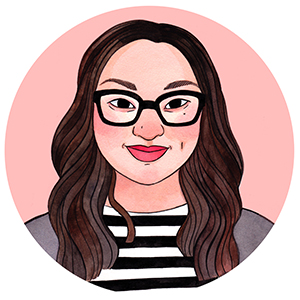
Katie Baker: The Content Wrangler
Katie Baker ’16 is premium publishing associate manager for Stitcher, an app that allows subscribers to listen to podcasts on demand.
In this behind-the-scenes role, she ensures that premium content is packaged, quality tested, and distributed through the app according to podcast partner agreements. Here, she discusses her love for podcasts and how managing the smallest details can be the most satisfying.
I’m obsessed with podcasts, and I have been for years. The ones I like most are the ones where it feels like a casual conversation with people you know … where you feel like these are your friends. Maybe you’re learning … maybe you’re laughing, and maybe you’re totally shocked.
I love my job. I collect all of the assets [podcast audio, artwork, metadata] and make sure that they’re going into our backend and out to the servers. I’m like the bridge. I make sure everything is in place before content goes out to the premium subscribers.
My boss says that my brain is wired for content operations. I just really enjoy fixing things and making things as perfect as possible. Even a little thing of making sure that a season is available to select …[and] adding numbered seasons to the menu. I think stuff like that is very satisfying.
Because I care so much, I don’t mind that I have to [be available to work] on Sunday through Thursday nights and possibly on Saturdays. It’s totally fine because I want that content to get out there.
I’m always learning. You have to be ready for all the things that could come up. You have to know how to work with other people and make sure that we’re all on the same page. Because podcasting [technology] is changing all the time, you have to be ready to go with it. Otherwise, you will be really left behind.
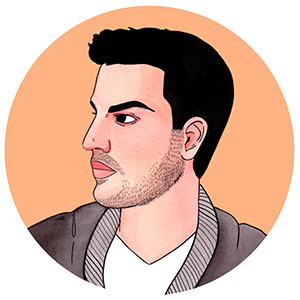
Steve Melin: The Composer
When Steven Melin ’14 first set out to help others tell stories through music, he focused on visual mediums like film, television, and video games. But he didn’t stop there. Realizing that versatility would lead to more employment opportunities, Melin expanded his skillset to include audio-only work. Today, he preaches the importance of maneuvering all mediums and genres.
“Advice to composers: The more skilled at multiple types of media projects you are, the better able you’ll be to find more work and really make it a full-time career. You need to be able to take what you’re best at as a music creator and apply it to all the different genres and mediums,” says Melin.
As a composer for digital media, Melin practices what he preaches. He lends his audio experience to everything from informational podcasts to fantasy audio dramas to his own Sonic Storytellers, where he tackles hot topics in the music business through personal anecdotes, interviews with industry-leading composers, and community-driven content.
“I do think there’s great power in being a master of something, but I just find I love the challenge and the newness and freshness of using my skillset in different types of media,” says Melin.
Getting Noticed
Podmass Reviewer Becca James Tells Us What Makes a Show Stand Out
In the ever-expanding world of podcasts, getting noticed is a challenge. When I first inherited The A.V. Club’s podcast reviews feature Podmass in 2014, this was especially evident. Back then, I could tell covering a limited amount of podcasts episode by episode wasn’t servicing our readers. Reimagined as a recommendations feature, Podmass now provides unending listening suggestions by highlighting recent exceptional episodes of a growing variety of podcasts. Here are a few things Podmass writers are always looking for when recommending shows.
Diversity
Whose voices are being centered and elevated?
From hosts to guests to production teams, it’s important to include a variety of voices, which in turn will provide listeners with a variety of perspectives.
Audio
What does your podcast actually sound like?
You don’t need an overpriced studio setup to get noticed, but you do need to take care while recording and editing. Listeners literally need to be able to hear you.
Uniqueness
What are you offering that’s different?
Certain podcasts genres are especially overloaded. Take film podcasts, for example. The ones that rise to the top do so by offering a unique experience that goes beyond the basics. A show like How Did This Get Made? Succeeds at this by specifically focusing on movies that are so bad they’re amazing.
